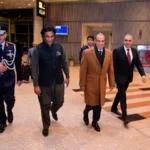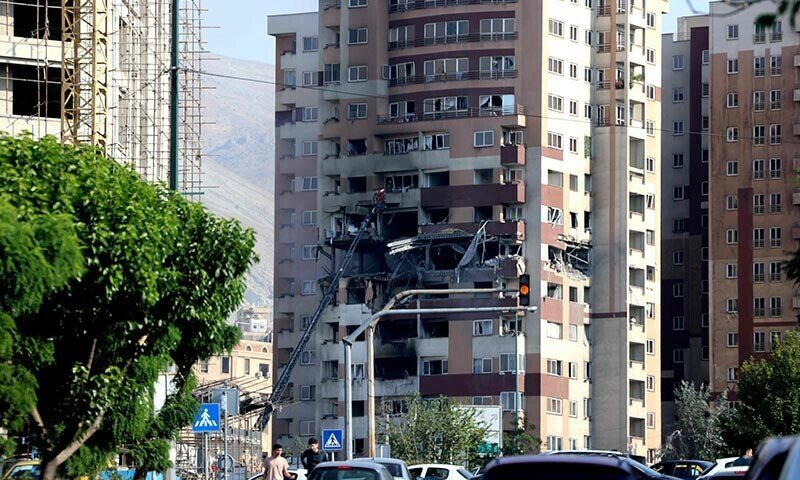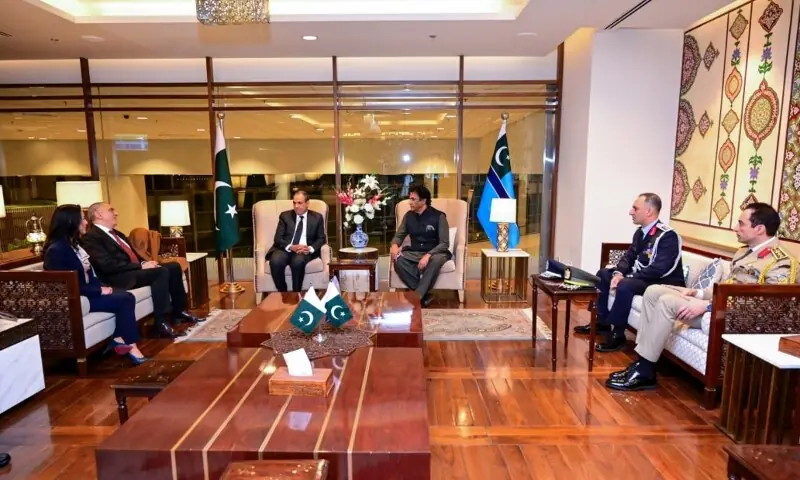Iran said Israel’s deadly strikes on its military and nuclear facilities on Friday were a “declaration of war” and called on the UN Security Council to act.
Israel launched widescale strikes against Iran early on Friday, saying it targeted nuclear facilities, ballistic missile factories and military commanders and that this was start of a “prolonged operation to prevent Tehran from building an atomic weapon.”
Iran promised a harsh response and Israel said it was working to intercept about 100 drones launched towards Israeli territory in retaliation.
But around 0800 GMT (1pm PKT), Israeli media said an order to citizens to remain near protected areas had been lifted, suggesting that most or all the drones had been neutralised.
Key developments so far:
- Iran says top commanders, including Hossein Salami, killed
- Israel says military intercepting drones fired from Iran in response
- At least 95 casualties so far, including women and children
- Iran’s supreme leader appoints new military commanders
- Trump urges Iran to make deal, warns of more “death and destruction”
In a letter to the United Nations, Iran’s Foreign Minister Abbas Araghchi described the attack as a “declaration of war” and “called on the UN Security Council to immediately address this issue”, the ministry said.
An Israeli security source said Israeli Mossad commandos had operated deep inside the Islamic Republic before the attack and the Israeli spy agency and military had led a series of covert operations against Iran’s strategic missile array.
Israel also established an attack-drone base near Tehran, the source added.
The military said it had carried out a large-scale strike against Iran’s air defences, destroying “dozens of radars and surface-to-air missile launchers”. Iranian media and witnesses reported explosions including at the main uranium enrichment facility at Natanz.
Iran’s elite Revolutionary Guards Corps said its top commander, Hossein Salami, had been killed and state media reported the unit’s headquarters in Tehran had been hit. Several children were killed in a strike on a residential area in the capital, they said.
At least 95 people were wounded in Israel’s attack and taken to medical centres in 12 different provinces that were targeted, national emergency services spokesperson Mojtaba Khaledi told state TV.
Iran’s supreme leader Ayatollah Ali Khamenei swiftly appointed new Revolutionary Guards and armed forces chiefs to replace those killed in targeted Israeli strikes on Friday.
In separate decrees, Khamenei named Mohammad Pakpour to replace Salami as commander of the Islamic Revolutionary Guard Corps, and Abdolrahim Mousavi to replace Mohammad Bagheri as chief of the armed forces general staff.
A senior adviser to Khamenei was wounded during the attack, state media reported.
“Ali Shamkhani, an advisor to the supreme leader… was injured in today’s attack by the Zionist regime,” according to state TV.
Earlier in the day, Israeli Prime Minister Benjamin Netanyahu said in a recorded video message: “We are at a decisive moment in Israel’s history.
“Moments ago Israel launched Operation Rising Lion, a targeted military operation to roll back the Iranian threat to Israel’s very survival. This operation will continue for as many days as it takes to remove this threat.”
Khamenei said in a statement that Israel had “unleashed its wicked and bloody” hand in a crime against Iran and that it would receive “a bitter fate for itself”.
An Israeli military official said Israel was striking “dozens” of nuclear and military targets including the facility at Natanz in central Iran. The official claimed Iran had enough material to make 15 nuclear bombs within days.
The United States said it had no part in the operation, which raises the risk of a fresh escalation in tensions in the Middle East, a major oil producing region.
Alongside extensive air strikes, Israel’s Mossad spy agency led a series of covert sabotage operations inside Iran, Axios reported, citing a senior Israeli official. These operations were aimed at damaging Irans strategic missile sites and its air defence capabilities.
At least six nuclear scientists were killed in Israel’s attacks, media outlets in the Islamic republic reported.
Iran’s Tasnim news agency named the six scientists including Mohammad Mehdi Tehranchi, who was the president of the Islamic Azad University of Iran. Fereydoun Abbasi, a former head of the Atomic Energy Organisation of Iran, was also among the scientists killed, it added.
A fresh round of explosions was heard in northwestern Iran, state television reported, following Israel’s wave of early morning strikes on multiple cities.
“A few minutes ago, new explosions were heard in East Azerbaijan,” the broadcaster said, as the Tasnim news agency said an earlier wave of strikes had hit 10 sites in the province, killing at least three people.
Pezeshkian administration: Iran will write the ending to this story
The administration of Iranian President Masoud Pezeshkian has released a statement, announcing that Iran will avenge the blood of every single individual killed in Israeli strikes, IRNA reported.
“With a savage regime as this,” the statement read, referring to Israel, “one shall not speak but with the language of power.”
“As of this moment, the Islamic Republic of Iran’s government has begun the necessary defensive, political, and legal measures to make the illegitimate Israel regret [its aggression] and will deny the Israelis a moment’s rest,” it said.
“The world now better understands Iran’s insistence on its right to enrichment and nuclear technology and missile power.”
Iran has in the past 200 years never started a war, the statement said, but will not hesitate the slightest to defend itself.
“The ending to this story will be written by Iran.”
Trump urges Iran to make a deal
US President Donald Trump urged Iran to “make a deal”, warning that there will be more “death and destruction” after Israel launched deadly strikes targeting Iranian nuclear facilities.
“There has already been great death and destruction, but there is still time to make this slaughter, with the next already planned attacks being even more brutal, come to an end,” Trump said on his Truth Social platform.
“Iran must make a deal, before there is nothing left… just do it before it’s too late,” he said.
Iran to make a deal over its nuclear programme, saying that there was still time for the country to prevent further conflict with Israel.
“There has already been great death and destruction, but there is still time to make this slaughter, with the next already planned attacks being even more brutal, come to an end,” Trump said in a post on Truth Social.
Earlier in the day, Trump said that Iran cannot have a nuclear bomb and that the US was hoping to get back to the negotiating table, in an interview with Fox News after the start of the Israeli air strikes on Iran.
“We will see,” Fox News reporter Jennifer Griffin quoted Trump as saying in a post on X.
Trump would convene a meeting of the National Security Council on Friday morning, the White House said. He had said on Thursday an Israeli strike on Iran “could very well happen” but reiterated his hopes for a peaceful resolution.
The US military is planning for the full range of contingencies in the Middle East, including the possibility that it might have to help evacuate American civilians, a US official told Reuters.
Iran’s armed forces spokesperson said Israel and its chief ally the United States would pay a “heavy price” for the attack, accusing Washington of providing support for the operation.
While the US tried to distance itself from Israel’s military operation, an Israeli
official told public broadcaster Kan that Israel had coordinated with Washington on Iran.
US Secretary of State Marco Rubio said the United States was not involved in the strikes and Tel Aviv had acted unilaterally for self-defence.
“We are not involved in strikes against Iran and our top priority is protecting American forces in the region,” Rubio said in a statement.
“Let me be clear: Iran should not target US interests or personnel,” he added.
The State Department issued an advisory saying that all US government employees in Israel and their family members should “shelter in place until further notice”.
UN nuclear watchdog chief ready to travel to Iran to assess situation
UN nuclear watchdog chief Rafael Grossi said he was ready to travel to Iran to assess the situation there after Israel’s strikes hit the sprawling nuclear complex at Natanz.
In a statement to a meeting of the International Atomic Energy Agency’s Board of Governors, Grossi said the other main enrichment centre in Iran, Fordow, was not hit and neither was another nuclear facility in Esfahan, citing Iranian authorities.
There are no elevated radiation levels at Natanz, he added.
“I call on all parties to exercise maximum restraint to avoid further escalation. I reiterate that any military action that jeopardizes the safety and security of nuclear facilities risks grave consequences for the people of Iran, the region, and beyond,” Grossi said in his statement.
“I have indicated to the respective authorities my readiness to travel at the earliest to assess the situation and ensure safety, security and non-proliferation in Iran.”
He did not say what the extent of the damage at Natanz was or what parts of the site were hit. The site includes a vast underground uranium enrichment plant and a smaller, above-ground pilot enrichment plant.
Iran is enriching to up to 60 per cent purity, close to the roughly 90pc of weapons grade, at the pilot plant, but it is producing smaller quantities of that material there than at Fordow, a site dug into a mountain that military experts have said would be difficult for Israel to destroy through bombardment.
“Despite the current military actions and heightened tensions, it is clear that the only sustainable path forward — for Iran, for Israel, the entire region, and the international community — is one grounded in dialogue and diplomacy to ensure peace, stability, and cooperation,” Grossi said.
Earlier today, Grossi said that nuclear facilities “must never be attacked”.
The UN nuclear watchdog said that Iranian authorities told it that no increase in radiation levels have been observed at the Natanz uranium enrichment site following Israeli strikes.
“Iranian authorities have informed the IAEA… that no increase in radiation levels has been observed at the Natanz site,” the International Atomic Energy Agency said in a post on X, after earlier confirming that the facility was “among targets” of the strikes.
It added that Iran’s only nuclear power plant in the southern port city of Bushehr had not been targeted.
However, Iran’s atomic energy organisation confirmed in a statement that its nuclear facility in Natanz had been damaged, but investigations have not shown any radioactive or chemical contamination outside the site.
“The attack has damaged several parts of the facility. Investigations are ongoing to assess the extent of damages,” the statement said.
Meanwhile, Israel’s neighbouring country Jordan’s military said it intercepted drones and missiles that had violated the kingdom’s airspace.
“Royal Air Force aircraft and air defence systems intercepted on Friday morning a number of missiles and drones that entered Jordanian airspace,” a military statement said.
Air raid sirens sounded in the Jordanian capital after Israel’s attack on Iran, while the public security directorate urged people to stay at home.
“Adhere to the guidelines and stay in your homes,” said an announcement on loudspeakers in Amman.
Jordan had earlier said it would not allow its airspace to be violated and vowed not to become a “battleground” in any regional conflict. “Jordan has not and will not allow any violation of its airspace, reaffirming that the Kingdom will not be a battleground for any conflict,” government spokesperson Mohammad Momani told AFP.
The government meanwhile condemned Israel’s attack, with foreign ministry spokesperson Sufian Qudah warning of “the consequences of such escalatory actions”.
Jordan also called the attack “a blatant violation of the sovereignty of a United Nations member state and a clear breach of international law and the UN Charter”.
Tel Aviv’s Ben Gurion Airport was closed until further notice, and Israel’s air defence units stood at high alert for possible retaliatory strikes from Iran.
“Following the pre-emptive strike by the State of Israel against Iran, a missile and UAV (drone) attack against the State of Israel and its civilian population is expected in the immediate time frame,” Defence Minister Israel Katz said in a statement.
Israeli military Chief of Staff Eyal Zamir said tens of thousands of soldiers had been called up and “prepared across all borders”.
“We are amidst a historic campaign unlike any other. This is a critical operation to prevent an existential threat, by an enemy who is intent on destroying us,” he said.
Israeli Minister Gideon Saar was holding “marathon of calls” with counterparts around the world regarding Israel’s attack on Iran, the foreign ministry said in a statement.
Pakistan was among several countries and international actors which condemned Israel’s strikes, with the Foreign Office calling it “unjustified and illegitimate aggression by Israel.”
Prime Minister Shehbaz Sharif condemned “in the strongest possible terms today’s unprovoked attack on Iran by Israel.”
“I convey my deepest sympathies to the Iranian people on the loss of lives in this attack. This grave and highly irresponsible act is deeply alarming and risks further destabilising an already volatile region,” he said in a post on X.
“We urge the international community and the United Nations to take urgent steps to prevent any further escalation that could imperil regional and global peace.”
Foreign Minister Ishaq Dar said on X that a 24/7 Crisis Management Unit has been created at the Ministry of Foreign Affairs to ensure the safety and security of Pakistani nationals in Iran.
“Pakistan Embassy in Tehran has also been directed to provide all facilitation to community members/Zaireens. The Embassy’s hotline number is (0098)-2166941388,” he said in a post on X.
The National Assembly also unanimously passed a resolution against Israel’s attack on Iran, which was jointly presented by the government and opposition.
The attacks triggered sharp falls in stock prices in Asian trade on Friday, led by a selloff in US futures, while oil prices jumped as investors scurried to safe havens such as gold and the Swiss franc.
UN Secretary-General Antonio Guterres condemned any military escalation in the Middle East, said deputy UN spokesperson Farhan Haq.
“The Secretary-General asks both sides to show maximum restraint, avoiding at all costs a descent into deeper conflict, a situation that the region can hardly afford,” Haq said.
Flight disruptions, airspace closure
Emirates airline said flights to and from Iraq, Jordan, Lebanon and Iran had been cancelled after Israel’s strikes sparking concerns of a wider escalation.
Several flights scheduled for Friday and one Tehran flight on Saturday were listed as cancelled on the airline’s website, with the Dubai international airport also reporting that “some flights at [DXB] and DWC — Al Maktoum International have been cancelled or delayed due to airspace closures over Iran, Iraq, and Syria” in a statement on X.
The United Arab Emirates capital’s international airport warned of flight disruptions.
“Flight disruptions are expected through today at Zayed International Airport. Passengers are advised to check with their airline for the latest status of their flights before travelling to the airport,” the Abu Dhabi airport said in a statement on X.
Qatar Airways said it had temporarily cancelled flights to Iran and Iraq “due to (the) current situation in the region,” the airline said in a statement.
German airline Lufthansa also said it had suspended all flights to and from Tehran.
“Lufthansa Group flights to and from Tehran will be suspended until further notice due to the current situation,” the company said in an emailed statement, adding it would also avoid Iranian, Iraqi and Israeli airspace for now.
Air France said it was suspending its flights to and From Tel Aviv “until further notice” and was “closely monitoring the situation in the Middle East in real time,” a spokesman for the French airline told AFP, adding that “the safety of its customers and crews is its absolute priority.”
Earlier on Friday, Iraq also closed its airspace. “The ministry of transport closes Iraqi airspace and suspends air traffic at all Iraqi airports,” the Iraq News Agency reported.
Nuclear talks
US and Iranian officials were scheduled to hold a sixth round of talks on Tehran’s escalating uranium enrichment programme in Oman on Sunday, according to officials from both countries and their Omani mediators.
A US official said those talks were still scheduled to proceed despite the Israeli attack.
The Israeli military said on Friday that it was forced to act based on new intelligence information showing that Iran was “approaching the point of no return” in the development of a nuclear weapon.
“In recent months, this program has accelerated significantly, bringing the regime significantly closer to obtaining a nuclear weapon,” it said in a statement, without disclosing the purported evidence.
A source familiar with US intelligence reports said there had been no recent change in the US intelligence assessment that Iran was not building a nuclear weapon and that Khamenei had not authorised the restarting of the nuclear weapons programme that was shuttered in 2003.
Additional reporting by Abdullah Momand and Irfan Sadozai









